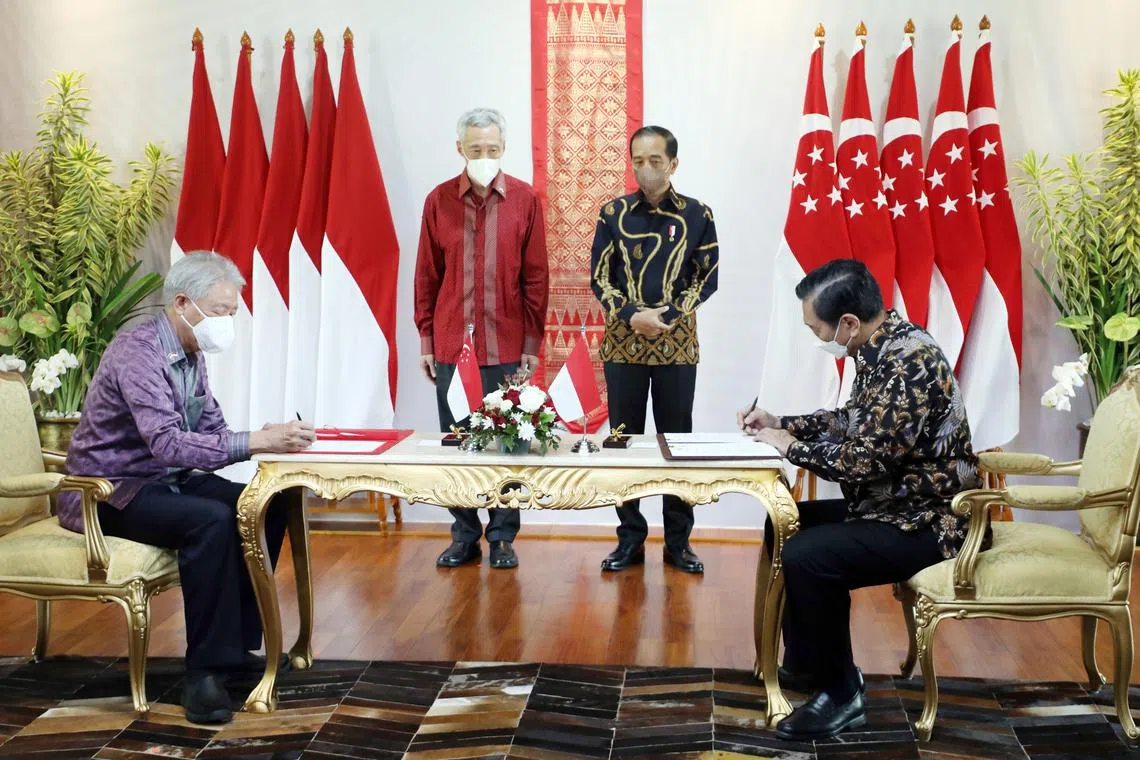Three landmark agreements between S’pore and Indonesia take effect, including on airspace management
Sign up now: Get ST's newsletters delivered to your inbox

PM Lee Hsien Loong and Indonesian President Joko Widodo looking on as Senior Minister Teo Chee Hean (seated, left) and Indonesian Coordinating Minister for Maritime Affairs and Investments Luhut Pandjaitan signed an exchange of letters undertaking to bring three agreements into force at the same time, at the Leaders’ Retreat in Bintan, in January 2022.
PHOTO: LIANHE ZAOBAO FILE
SINGAPORE - Three landmark pacts between Singapore and Indonesia officially came into force on March 21, in a major milestone for bilateral relations.
The three agreements – which deal with airspace management, defence cooperation and extradition – were inked in January 2022,
Singapore’s Ministry of Foreign Affairs (MFA) said the agreements’ entry into force was a historic landmark in Singapore-Indonesia relations that underscored the strength and maturity of the two countries’ relationship.
To commemorate the occasion, PM Lee and President Widodo spoke on the phone on March 22.
During their call, PM Lee reaffirmed Singapore’s commitment to working closely with Indonesia to address shared challenges, and expressed confidence that the bilateral relationship will continue to break new ground.
“The agreements signal our shared commitment to working together as neighbours to secure outcomes in the best interest of both our countries,” MFA added in its March 22 statement.
The agreements come into force a year after Singapore and Indonesia jointly applied in March 2023 to the International Civil Aviation Organisation
The three agreements entering into force simultaneously resolve longstanding sensitive issues in the bilateral relationship between the two neighbouring countries that go back decades.
They were carefully negotiated for a good balance of benefits for both sides so that they are durable and for the long haul, Senior Minister Teo Chee Hean told Parliament in February 2022.
PM Lee stressed the importance of the three agreements in the House in April 2023, which he said represented “major progress” in the relationship between Singapore and Indonesia.
He said then: “If we had left these issues unresolved, they would have festered, and quite likely one day turned rancorous. This would have soured the entire relationship, which would have benefited neither side.”
On March 22, 2024, PM Lee said in a Facebook post: “The agreements are a major milestone in relations between Singapore and Indonesia.
“(I) look forward to our going further, to explore promising new areas of cooperation in the years ahead.”
SM Teo also spoke with Indonesia’s Coordinating Minister for Maritime Affairs and Investments Luhut Binsar Pandjaitan after the agreements entered into force.
SM Teo said the agreements laid a strong foundation for further bilateral cooperation in new areas such as sustainability, green energy, healthcare and the digital economy.
Mr Luhut was SM Teo’s counterpart in the negotiation and ratification of the set of agreements. For his significant contributions to Singapore-Indonesia relations, Mr Luhut was conferred the Darjah Utama Bakti Cemerlang, or Distinguished Service Order, in June 2023.
These are the three agreements between Singapore and Indonesia:
Flight Information Region (FIR) Agreement
Airspace is vital for Singapore and politically important to the Indonesians, PM Lee had noted in April 2023.
Under the FIR agreement, Singapore and Indonesia agreed to realign the boundary between the Singapore and Jakarta FIRs, largely to take into account Indonesia’s archipelagic and territorial baselines.
The Singapore FIR, which air traffic controllers here have managed since 1946, had previously covered the airspace over Indonesia’s Riau and Natuna islands.
Under the agreement, this airspace is now part of the Jakarta FIR, but with portions delegated to Singapore to continue providing air navigation services for 25 years.
The new arrangement ensures that present and future traffic to Changi Airport and nearby Indonesian airports continues to be managed safely and efficiently.
Defence Cooperation Agreement (DCA)
The DCA clarifies arrangements for the Singapore Armed Forces’ (SAF) training in Indonesian waters and airspace, while respecting Indonesia’s sovereignty over its territory and preserving Singapore’s rights.
The agreement and its implementation arrangement were both signed in 2007.
The SAF has been conducting training in the designated South China Sea Danger Area since the 1960s, when the area was in international waters.
Parts of this area became Indonesian archipelagic and territorial waters and airspace under the 1982 United Nations Convention on the Law of the Sea (Unclos). The SAF’s training activities in such areas have continued as a right provided under Article 51 of Unclos.
The DCA and its implementing arrangement between both countries’ armed forces for the military training area in Indonesia will remain in force for 25 years.
Extradition treaty
This treaty between Singapore and Indonesia grants extradition for a comprehensive list of offences, including corruption, money laundering and bribery, in accordance with the laws of both countries and safeguards provided in the treaty.
Extradition refers to the handover of individuals wanted for a crime in the other country.
PM Lee had said in April 2023 that the treaty was something Indonesia had long pressed for, but it was not straightforward to do because the two countries’ legal systems are so different.
The treaty adds to Singapore’s extradition agreements with many jurisdictions around the world, such as Germany, Hong Kong, Malaysia and the United States. The Republic also has similar arrangements with 40 declared Commonwealth countries, including Australia, Canada, India and the United Kingdom.
The treaty with Indonesia can be retrospectively applied to crimes committed up to 18 years ago.



